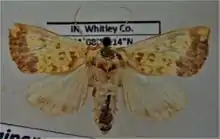Papaipema cerina
Papaipema cerina, the golden borer moth, is a bright yellow moth of the family Noctuidae. Adults are on the wing from September through mid-October and can be found in patches throughout the Great Lakes region of North America. It has been recorded from Indiana, Michigan, Illinois, Maine, Ohio, Wisconsin, Iowa and Ontario.[1] Their habitats include wetlands such as emergent marsh, southern wet meadow, wet prairie, wet-mesic sand prairie, prairie fen, southern hardwood swamp, mesic southern forest and dry-mesic southern forest.[2]
| Papaipema cerina | |
|---|---|
 | |
| Scientific classification | |
| Kingdom: | |
| Phylum: | |
| Subphylum: | |
| Class: | |
| Order: | |
| Family: | |
| Tribe: | |
| Genus: | |
| Species: | P. cerina |
| Binomial name | |
| Papaipema cerina (Grote, 1874) | |
| Synonyms | |
| |
Hosts
Larvae feed on lilies and May apple.[3] Also bottlebrush grass (Hystrix patula) and dark green bullrush (Scirpus atrovirens). The larva bores into the shoot or roots of its host. The larvae start in grass and then generally switch to Lilium and related plants and Podophyllum.[2]
Status
Uncommon to rare.
References
- "P. cerina". Moth Photographers Group. Retrieved 3 January 2017.
- Michigan Natural Features Inventory
- Beadle, David; Leckie, Seabrooke (2012). Peterson Field Guide to Moths of Northeastern North America (1st ed.). New York: Houghton Mifflin Harcourt. p. 454. ISBN 978-0-547-23848-7.